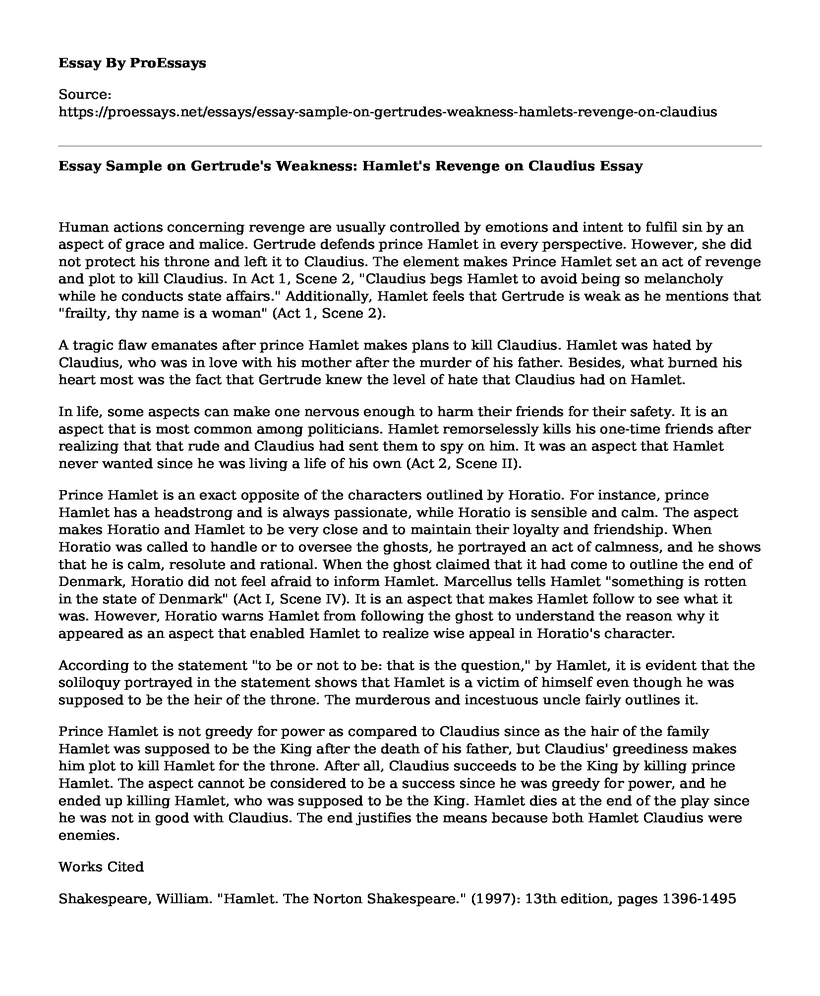Human actions concerning revenge are usually controlled by emotions and intent to fulfil sin by an aspect of grace and malice. Gertrude defends prince Hamlet in every perspective. However, she did not protect his throne and left it to Claudius. The element makes Prince Hamlet set an act of revenge and plot to kill Claudius. In Act 1, Scene 2, "Claudius begs Hamlet to avoid being so melancholy while he conducts state affairs." Additionally, Hamlet feels that Gertrude is weak as he mentions that "frailty, thy name is a woman" (Act 1, Scene 2).
A tragic flaw emanates after prince Hamlet makes plans to kill Claudius. Hamlet was hated by Claudius, who was in love with his mother after the murder of his father. Besides, what burned his heart most was the fact that Gertrude knew the level of hate that Claudius had on Hamlet.
In life, some aspects can make one nervous enough to harm their friends for their safety. It is an aspect that is most common among politicians. Hamlet remorselessly kills his one-time friends after realizing that that rude and Claudius had sent them to spy on him. It was an aspect that Hamlet never wanted since he was living a life of his own (Act 2, Scene II).
Prince Hamlet is an exact opposite of the characters outlined by Horatio. For instance, prince Hamlet has a headstrong and is always passionate, while Horatio is sensible and calm. The aspect makes Horatio and Hamlet to be very close and to maintain their loyalty and friendship. When Horatio was called to handle or to oversee the ghosts, he portrayed an act of calmness, and he shows that he is calm, resolute and rational. When the ghost claimed that it had come to outline the end of Denmark, Horatio did not feel afraid to inform Hamlet. Marcellus tells Hamlet "something is rotten in the state of Denmark" (Act I, Scene IV). It is an aspect that makes Hamlet follow to see what it was. However, Horatio warns Hamlet from following the ghost to understand the reason why it appeared as an aspect that enabled Hamlet to realize wise appeal in Horatio's character.
According to the statement "to be or not to be: that is the question," by Hamlet, it is evident that the soliloquy portrayed in the statement shows that Hamlet is a victim of himself even though he was supposed to be the heir of the throne. The murderous and incestuous uncle fairly outlines it.
Prince Hamlet is not greedy for power as compared to Claudius since as the hair of the family Hamlet was supposed to be the King after the death of his father, but Claudius' greediness makes him plot to kill Hamlet for the throne. After all, Claudius succeeds to be the King by killing prince Hamlet. The aspect cannot be considered to be a success since he was greedy for power, and he ended up killing Hamlet, who was supposed to be the King. Hamlet dies at the end of the play since he was not in good with Claudius. The end justifies the means because both Hamlet Claudius were enemies.
Works Cited
Shakespeare, William. "Hamlet. The Norton Shakespeare." (1997): 13th edition, pages 1396-1495
Cite this page
Essay Sample on Gertrude's Weakness: Hamlet's Revenge on Claudius. (2023, May 22). Retrieved from https://proessays.net/essays/essay-sample-on-gertrudes-weakness-hamlets-revenge-on-claudius
If you are the original author of this essay and no longer wish to have it published on the ProEssays website, please click below to request its removal:
- Catharsis in 'The Waste Land' Poem Essay
- The Valley of Bewilderment: Conference of the Birds Essay
- The Source of Peace: The Vantage Point by Robert Frost Essay Example
- Literary Analysis Essay on Symbolism in To Kill a Mockingbird
- Research Paper on Kehinde Wiley: Early Exposure to Art Shapes Successful African-American Writer
- Language: A Powerful Tool to Express & Relate - Essay Sample
- Essay Example on Rip Van Winkle: An American Tale of Revolution and Resistance







